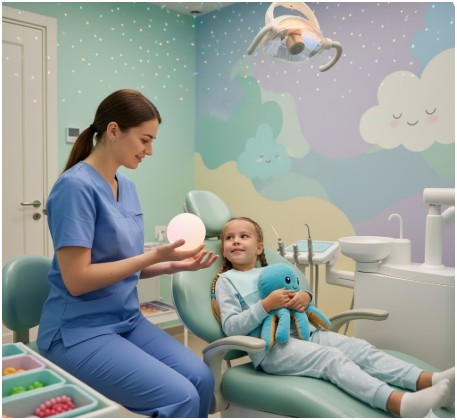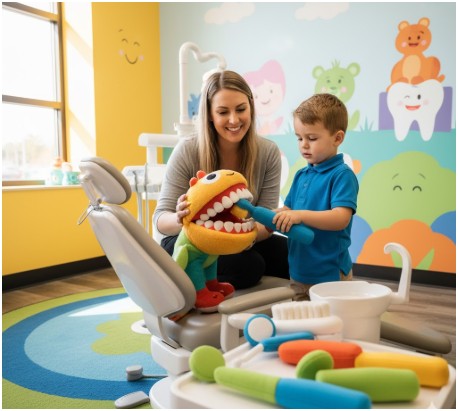Children approach dental visits with a mix of curiosity and hesitation, and this shapes the atmosphere of each appointment. Skilled dentists create a gentle space that helps young patients feel secure from the moment they walk in. Their approach blends clinical knowledge with emotional awareness to guide children through every step.
A calm chairside manner eases tension and builds early trust. Clear explanations help children feel more in control during unfamiliar procedures. This foundation encourages confident smiles and smooth cooperation during treatment.
How Skilled Dentists Manage Kids’ Dental Issues

Support Through Clear Communication
A kids dentist uses simple language to explain every tool and step. This helps reduce fear and encourages meaningful engagement from the child. Calm conversations guide young patients through each stage and make the experience easier to handle. Parents observe how this communication style encourages a relaxed rhythm during appointments. Children respond well when messages are delivered at a steady pace.
Gentle Techniques for Sensitive Situations

Clinicians adjust their methods based on each child’s comfort level to build a supportive experience. Soft movements help children feel a sense of safety during examinations. This care reduces tension around routine visits and more complex procedures. A child’s facial cues guide each step. These signals help the dentist shape the pace of the visit.
Use of Kid-Friendly Tools
Tools Designed for Comfort
- Small instruments lower the sense of pressure during treatment.
- Colorful equipment helps shift focus away from fear.
- Soft lighting and mild flavors in materials create a soothing environment.
Tools That Encourage Engagement
- Pretend practice sessions help children explore instruments safely.
- Models of teeth help clarify how certain procedures work.
- Visual props make instructions easier to follow.
Strategies for Reducing Anxiety

Skilled dentists introduce distraction techniques to create moments of relief during procedures. Light conversation diverts attention during challenging steps. Games or simple breathing guidance support emotional balance throughout the visit.
Music or gentle sounds help shift the mood toward comfort. Sensory elements assist children who react strongly to noise or unfamiliar textures. These methods help shape a stable emotional space during treatment.
Encouragement for Positive Habits
Motivational Approaches
- Praise strengthens confidence during each stage of the appointment.
- Small rewards celebrate cooperation and strengthen positive memories.
- Guided demonstrations help children learn healthy brushing routines with ease.
Parental Inclusion in the Process

Parental support plays a meaningful role in shaping a child’s comfort level. Dentists share guidance that aligns with the child’s developmental stage. This partnership helps reinforce healthy habits between visits.
Clear suggestions for at-home care encourage steady routines. Parents learn how to prepare their child for the next appointment with simple tips. This teamwork nurtures long-term dental confidence.
Adaptation for Unique Personalities
Children react in different ways based on temperament and past experiences. A skilled kids dentist adjusts their approach to match these individual needs. A quiet child may benefit from slow pacing, while an energetic child may need more structure.
Flexible strategies create space for each child to feel understood. This tailored care builds reliable trust and prevents future anxiety. The child thus begins to see dental visits as manageable and secure.
Fosters a Sense of Safety
A supportive environment encourages exploration and curiosity. Friendly staff members help create a welcoming atmosphere at each stage of the visit. Decor suited for young patients sets a playful tone without distracting from care.
Children feel calmer when their surroundings seem familiar and warm. This sense of safety shapes healthier attitudes toward oral care. The experience thus becomes smoother with each returning visit.
Skilled dentists guide children through dental challenges with patience and awareness. Their methods help young patients feel safe and understood. Thus, this steady care plants the seeds for lifelong oral health.










